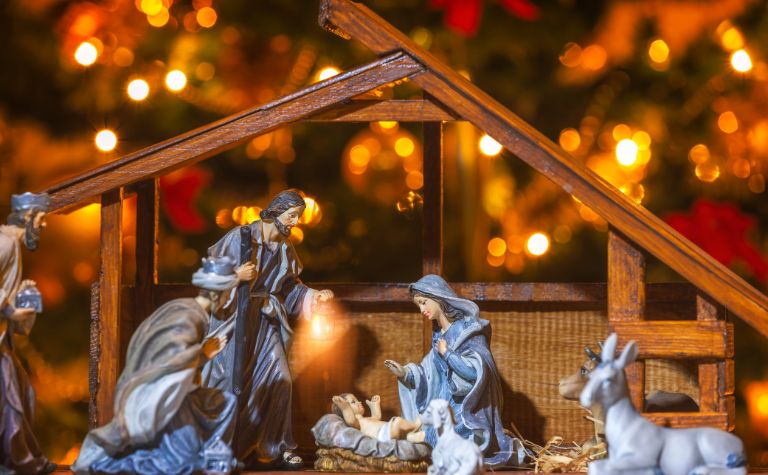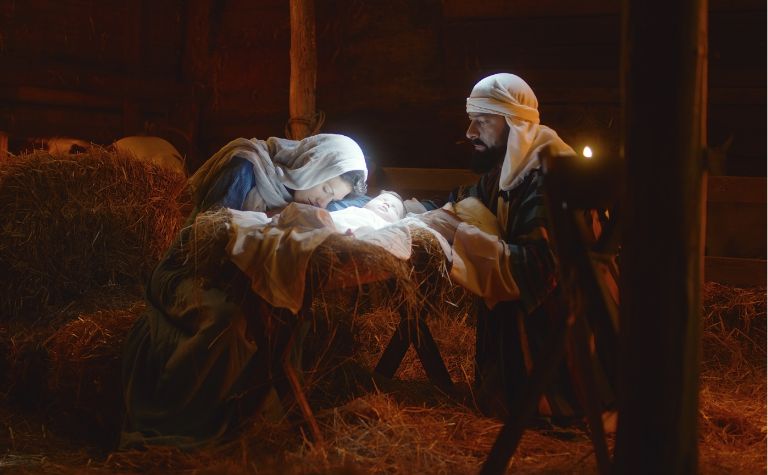The birth of Jesus Christ is a central event in Christian history, marking the incarnation of God in human form.
This momentous occasion is celebrated annually as Christmas, a holiday that holds deep religious and cultural significance.
While the Nativity story is familiar to many, there is a fundamental question that often arises: Where was Jesus born?
In this article, we will explore the biblical accounts, prophecies, historical context, and the modern site of the Nativity to determine the location of Jesus’ birth.

The Biblical Account of Bethlehem
The primary source for identifying the birthplace of Jesus is the New Testament, specifically the Gospel of Matthew.
In the book of Matthew, we find a clear reference to the town where Jesus was born.
Matthew 2:1 (ESV) states, “Now after Jesus was born in Bethlehem of Judea in the days of Herod the king, behold, wise men from the east came to Jerusalem.”
This verse unequivocally identifies Bethlehem in Judea as the birthplace of Jesus.
The Gospel of Matthew provides details about the journey of the Magi, also known as the Wise Men, who followed a star to find the child Jesus.
Their visit to Bethlehem is a significant part of the Nativity story, confirming the town’s role in Jesus’ birth.

The Prophecy of Micah
Another important piece of evidence supporting Bethlehem as Jesus’ birthplace is found in the Old Testament, specifically in the book of Micah.
This prophecy predates the birth of Jesus and foretells the birthplace of the Messiah.
Micah 5:2 (ESV) states, “But you, O Bethlehem Ephrathah, who are too little to be among the clans of Judah, from you shall come forth for me one who is to be ruler in Israel, whose coming forth is from of old, from ancient days.”
This prophecy from Micah is remarkably specific.
It identifies Bethlehem, specifically Bethlehem Ephrathah, as the birthplace of the coming ruler of Israel.
The mention of Bethlehem in both Matthew’s Gospel and Micah’s prophecy aligns perfectly, further solidifying Bethlehem’s role as the birthplace of Jesus.

Historical Context of Bethlehem
Understanding the historical and geographical context of Bethlehem is crucial to affirming its significance as the birthplace of Jesus.
Bethlehem was a town in ancient Judea, located approximately five miles south of Jerusalem.
Its name, “Bethlehem,” means “house of bread,” signifying its role in the agricultural region of Judea.
Bethlehem’s significance is further emphasized by its association with King David.
David, the beloved king of Israel, was born in Bethlehem, and it is often referred to as the “City of David.”
The importance of Bethlehem in the Davidic lineage connects it to Jesus’ ancestry.
According to the Gospel of Matthew, both Mary and Joseph were of the house of David, which is why they traveled to Bethlehem for the census.
The Modern Site of the Nativity
Today, the site believed to be the location of Jesus’ birth is marked by the Church of the Nativity, located in Bethlehem, in the West Bank.
The Church of the Nativity is one of the oldest continuously operating churches in the world and holds immense religious and historical significance.
The church’s interior includes the Grotto of the Nativity, a cave-like structure that is traditionally considered the birthplace of Jesus.
A silver star marks the exact spot where, according to tradition, Jesus was born.
Pilgrims from around the world visit this site to pay homage to the newborn Savior.
The Church of the Nativity also houses the adjoining Church of St. Catherine, known for its beautiful medieval architecture and artwork.
Together, these structures serve as a testament to the enduring reverence for Bethlehem as the birthplace of Jesus.
Controversies and Debates
While the biblical and historical evidence strongly supports Bethlehem as the birthplace of Jesus, it’s important to acknowledge that there have been occasional controversies and debates surrounding this topic.
Some skeptics and scholars have raised questions about the reliability of the Gospel accounts, suggesting that the mention of Bethlehem could have been added to align with the prophetic expectation of the Messiah’s birthplace.
However, the consensus among biblical scholars is that the Gospel accounts, particularly the Gospel of Matthew, provide credible historical information.
Additionally, historical records from the time of Jesus, such as the Roman census, lend support to the idea that people, including Mary and Joseph, would have traveled to their ancestral towns for registration.
Bethlehem’s association with King David further strengthens its credibility as a birthplace, as it aligns with Jesus’ Davidic lineage.
In summary, while there may be occasional debates and skepticism, the weight of historical and biblical evidence overwhelmingly supports Bethlehem as the birthplace of Jesus.
This ancient town continues to be a place of deep spiritual significance, drawing pilgrims and believers from all corners of the world to commemorate the birth of the Savior, Jesus Christ.
Bethlehem’s enduring legacy serves as a reminder that faith, history, and tradition intersect in profound ways, enriching the story of Jesus’ birth and our understanding of its impact on humanity.
Conclusion
The evidence from the biblical accounts, prophecies, historical context, and the modern site of the Nativity leaves little doubt that Jesus was born in Bethlehem.
This small town, nestled in the region of Judea, played a pivotal role in the unfolding of God’s plan for humanity.
Bethlehem’s significance extends beyond its historical and geographical attributes; it symbolizes the fulfillment of divine prophecies and the arrival of the long-awaited Messiah.
The birth of Jesus in Bethlehem underscores His role as the King of Kings, the fulfillment of Old Testament prophecies, and the Savior of the world.
As we celebrate Christmas and reflect on the Nativity story, let us remember Bethlehem’s central place in the narrative of Jesus’ birth.
It serves as a poignant reminder of the profound impact that a small town, chosen by divine providence, can have on the course of human history and the spiritual journey of millions around the globe.
Bethlehem, the birthplace of Jesus, continues to be a place of pilgrimage, worship, and reflection, reminding us of the enduring significance of this humble town in the story of our faith.
Related Questions
Joseph, the husband of Mary and the earthly father of Jesus Christ, is depicted in the Gospels as humble, law-abiding, and obedient. In many Christmas scenes, such as in displays of the manger, he is...
The virgin Mary, the mother of Jesus, is one of the most fascinating people in the Bible. For 2,000 years, people of different eras and cultures have marveled at her faith in God. Mary's story in the...
